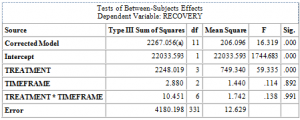Charlotte L. Hoopes and Dr. Kristie Seawright, Romney Institute of Public Management
Despite the efforts and precautions a company may take to avoid errors or breakdowns during service delivery, failures are, at one time or another, bound to occur. Still, as unavoidable as service failures appear, organizations cannot afford to ignore the significant costs that result from customer defection and negative word of mouth.
When service failures have occurred, service recovery is one of the primary ways a firm can retain its customers and minimize the costs associated with customer defection and negative word of mouth. Service recovery has been defined as a “thought-out, planned process for returning aggrieved customers to a state of satisfaction with the firm after a service or product has failed to live up to expectations.”
One of the important antecedents to developing an effective service recovery system is understanding what customers expect from service recovery. Understanding expectations is doubly important in a country like Argentina, where customer service and service recovery are relatively new concepts for businesses. Significant economic fluctuations only add to the importance of understanding customer expectations and understanding how these might change during periods of economic turmoil.
In late 2001, Argentina suffered what many have called the country’s most severe collapse in over a century. Among the many devastating effects for the “bright child” of South America, Argentina announced the biggest sovereign default in history and devalued the peso. The peso’s value continued to spiral downward in the months that followed the collapse, while unemployment rates surged high into the double digits and per capita GDP fell significantly.
For my research, I hypothesized that in environments of economic fluctuation and instability, customer expectations for service recovery would likely change considerably from what they were under more stable conditions. I believed that by studying and measuring customer expectations in Argentina, retailers and service providers – particularly global firms – would better understand how customer expectations change under conditions of economic instability.
As is commonly done in service operations literature, I developed a written scenario to measure customer expectations for service recovery. The scenario was set in three different timeframes in order to measure whether expectations changed as the economy fluctuated. The three timeframes were as follows: (1) 2000, the year before the economic collapse, (2) 2002, the year following the collapse, and (3) the current timeframe, which did not include any date specification or historical background information. Following the service failure scenario was one of five recovery treatments: (1) apology only, (2) apology and empathy, (3) apology, empathy, and fixing the problem, (4) fixing the problem only, and (5) apology, empathy, fixing the problem, and value-added atonement. Each survey participants received one of the 15 versions of the survey (3 time frames x 5 recovery treatments) and was asked to read the scenario and treatment and then respond to four questions commonly used in the marketing literature to measure customer expectations and satisfaction. Between 25 and 30 surveys were collected for each of the 15 versions of the survey.
A univariate analysis of variance on the data revealed statistically significant differences between the recovery treatments; however, variations among the three timeframes were not statistically significant (see Table 1 below).

Unfortunately, the results for this study reveal little about customers’ changing expectations during times of economic instability. These results could perhaps be explained by the difficulty individuals have in recalling to recall what they would have expected in the past or to distinguish past expectations from current expectations. It is also possible, however, that expectations among Argentines truly do not vary considerably during times of economic fluctuations. As one report on Argentina’s recovery explained, “The 2001-02 collapse was exceptional in its severity, but wild economic fluctuations have been the norm in Argentina for decades.” Believing that the economy will once again recover as it has so many times before, Argentines may have more or less consistent expectations for service recovery even in the midst of economic fluctuation.
While the study did not reveal much regarding changing expectations in unstable economies, results for the study did shed some light on customer expectations in general in Argentina. Results across all three timeframes consistently indicate that recovery matters. That is, once a failure has occurred, customers expect that companies will take steps to fix the failure and to recover the customer. If this does not occur, customers will not recommend the business to others and will likely cease to patronize the business themselves. They are overwhelmingly unsatisfied with just an apology, with their satisfactions levels increase significantly across the spectrum that ranges from a treatment of apology only to a treatment that includes apology, empathy, fixing the problem, and value-added atonement.
